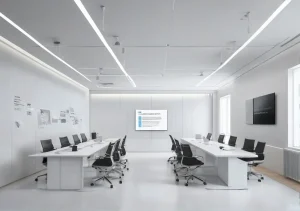Working from home, buried under emails and to-do’s, you almost miss the line where your well-being should take precedence. It’s easy to forget that behind every screen is a human being—and sometimes that human needs support.
In this post, you’ll discover the compassionate side of Microsoft and how they’re leading the charge in employee mental health support.
How Extensive is Microsoft’s Mental Health Support?
When we talk about taking care of our workforce, Microsoft doesn’t just talk the talk; they walk the walk. The tech giant’s mental health support network is comprehensive, encompassing everything from traditional counseling services to innovative online tools and resources designed for stress management and promoting work-life balance.
Employees can tap into a suite of services including professional counseling, which is available both in-person and via telehealth options. There’s also a focus on prevention and education, so you’ll find a plethora of workshops designed to help you nip stress in the bud and build resilience. Need a breather? Microsoft has got your back with mental health days so you can recharge without dipping into your vacation time.
Microsoft understands that mental fitness is just as crucial as physical wellness. So, alongside counseling and time-off, employees have access to mindfulness and meditation apps to cultivate inner peace amidst the coding chaos. Additionally, their Employee Assistance Program offers tools and resources to help tackle the everyday challenges that can throw us off balance.
Can You Get Help Anonymously?
Privacy matters. Full stop. That’s why Microsoft ensures the confidentiality of its mental health services. If you’re someone who values anonymity, you’ll find solace in knowing that you can access most of Microsoft’s resources without revealing your identity.
Employees looking for guidance or support can do so with peace of mind, whether that’s chatting with a counselor under the radar or browsing through self-help materials incognito. Matters of the mind are personal, and Microsoft gets that; they’ve structured their programs to respect and protect your privacy every step of the way.
What Initiatives Encourage a Balanced Lifestyle?
Now, let’s not forget about keeping work and life in a healthy tango rather than a nightly wrestling match. Microsoft encourages a balanced lifestyle with a range of initiatives that go beyond the office cubicle. Flexibility is king; remote work options and flexible hours allow you to work around your life, not the other way around.
But wait, there’s more! Microsoft keeps the body in mind as well as the spirit, with fitness programs and centers that encourage you to stay active. And for those who thrive in company, there are numerous social clubs and groups that help you forge strong connections with your peers.
These initiatives are like pieces of a puzzle that fit together to create a holistic approach to your well-being. It’s not just about hitting deadlines and quarterly targets; it’s equally about hitting the trails with a hiking group or enjoying a moment of Zen in a yoga session. That’s the Microsoft way – a life well-lived both inside and outside work.
Remember, mental health and well-being are not just buzzwords—they’re essential to a fulfilling life and career. Microsoft seems to recognize that and provides their employees with a garden of tools to cultivate their best selves. And it’s these daily acts of balance, connection, and personal growth that keep the garden blooming all year round.
How Does Microsoft Support Remote Workers?
When it comes to supporting remote workers, Microsoft is on the ball. The tech giant understands that working from the comfort of your home can sometimes feel isolating and that Zoom meetings can’t always replace the camaraderie of the office watercooler. To counter these unique challenges, Microsoft has put their heads together to create a web of support that helps remote workers feel less detached and more like an integral part of the team.
Tailored Mental Health Programs:
First on the list is the bevy of mental health resources tailored specifically for those clocking in from afar. Microsoft offers virtual counseling sessions and mental health days, making sure employees can step back when the lines between home and work get too blurred.
Virtual Team Building:
Then, we have the emphasis on virtual team building. Creative workshops and coffee chats keep things light-hearted, while company-wide virtual events, like the famous Microsoft Puzzle Hunt, bind distant employees through shared experiences and a touch of friendly competition.
- Flexible Work Hours:
Flexibility isn’t just a buzzword at Microsoft; it’s a way of life, especially for remote workers. Recognizing that the traditional 9-to-5 doesn’t always mesh with today’s varied lifestyles, Microsoft champions work hours that fit around employees’ personal schedules.
Connection Through Tech:
Let’s not forget the seamless integration of communication tools like Teams and Yammer. Microsoft ensures no one skips a beat, providing platforms where employees can connect, collaborate, and support each other all day, every day.
Virtual Health and Wellness Resources:
And because physical well-being is just as important as mental health, Microsoft offers a smorgasbord of virtual wellness resources, from online workout sessions to meditation breaks. All with the aim of keeping that remote work-life balance in tip-top shape.
Are There Peer Support and Community Networks?
Picture this: An environment where every employee, whether they’re a stone’s throw from HQ or working remotely from a mountain cabin, feels like they’re part of a caring community. At Microsoft, that’s not just wishful thinking – it’s a reality, thanks to a robust fabric of peer support and community networks that have made a world of difference.
Employee Resource Groups (ERGs):
Microsoft boasts an impressive array of ERGs. These are voluntary, employee-led groups that focus on fostering diversity and inclusion. More than just social clubs, these groups provide a safe space where employees can find support around shared characteristics or life experiences, ranging from the LGBTQ+ community to parents and caregivers.
Mental Health Allies Program:
One program that stands out and reflects Microsoft’s forward-thinking approach is the Mental Health Allies Program. It trains employees to become skilled listeners who can provide resources and support for colleagues struggling with mental health. Think of them as the first responders for mental wellness.
- Community-Driven Initiatives:
Beyond formal programs, Microsoft encourages community-driven initiatives. These grassroots movements start small but can make a huge difference, like a team collectively deciding to block out “no-meeting Fridays” to reduce digital fatigue. It’s these unique touches that show Microsoft has its finger on the pulse of what remote workers truly need.
Peer-to-Peer Recognition Programs:
Microsoft doesn’t miss a chance to celebrate its people. Through peer-to-peer recognition programs, employees can give each other virtual pats on the back for a job well done, reminding everyone that their contributions don’t go unnoticed, regardless of where their desk is located.
- Online Forums and Discussion Platforms:
Lastly, Microsoft sets the stage for open conversations with online forums and discussion platforms that facilitate the sharing of stories, experiences, and advice amongst employees from around the globe.
By weaving together these strands of support and community, Microsoft doesn’t just talk the talk; they walk the walk, creating an inclusive ecosystem where remote workers don’t just survive – they thrive.
- Microsoft provides an extensive mental health support network, including professional counseling and mindfulness apps, to ensure employees’ mental fitness.
- Confidentiality is paramount, with anonymous access to most mental health resources, allowing employees to seek help without fear of exposure.
- Work-life balance is a priority, with flexible work hours, remote work support, and community networks to maintain a connected and inclusive culture.


